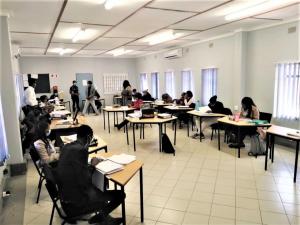Contact Tracing: A Key Way to Stagnate COVID-19
Contact tracing is looked upon as the bridge between lockdown and the COVID-19 vaccine, allowing the Namibian government to identify clusters of infections and, to stop people from passing on the virus. Without an effective system, health researchers have warned that public places, such as recreation zones, are not able to safely reopen and continue general practice.
In agreement with the above statement is Sindiso Moyo, who is employed by the United Nations Population Fund (UNFPA) as a health activist and consultant. Moyo, who is currently studying towards a Masters Degree in Public Administration at the University of Namibia, has also been seconded by UNFPA to work as part of a team of 6 young people in the emergency operations centre under the contact tracing department.
“At the most basic level, controlling COVID-19 depends on interrupting its spread from person to person. This means stopping COVID-19 by disrupting transmission using quarantine, personal protective equipment (such as facemasks) and hygiene measures; treating infected people and in the absence of a vaccine, identifying and isolating infected people, that is to say contact tracing, is currently the only option”, Moyo explains.
Although contact tracing is now increasingly more understood as a topic, addressing the mental side of the “testing” component as part of the former is sometimes an overlooked aspect of healthcare. In many cultures around the world, experiences related to the mind are not conceptualised as a health issue. Fortunately, this is not the case in Namibia. In fact, for the Namibian health system, in the context of COVID-19 testing, developing mental health infrastructure as part of the country’s health systems is a contemporary encounter with important conceptual and ethical questions. It is against this background that Moyo concurs with easing the mind of someone before getting tested and, more importantly for someone who tests positive with COVID-19.
Testing for COVID-19 involves inserting a 6-inch long swab (like a long Q-tip) into the cavity between the nose and mouth for 15 seconds and rotating it several times. The swabbing is then repeated on the other side of the nose to make sure enough material is collected. The swab is then inserted into a container and sent to a lab for testing.
“While the testing procedure may be an uncomfortable process, as a way to calm the mind of someone about to undergo the test, we explain to them that testing is important to reduce the disease spread and future exposures. Subsequently, if found positive with COVID-19, ethical and compassionate action, simply put isolation with close monitoring, is taken with the patient so as to minimize transmission within their families and communities”, says Moyo.
Moyo acknowledges that while organizations such as UNFPA and the World Health Organization (WHO), have been instrumental in supporting the efforts of contact tracing, it still remains to be a laborious activity. Moyo states that the duty of a contact tracer, since the surge of COVID -19 cases, has become extremely hectic as the role has now evolved to case investigation and infection source investigation. To put this into context, in addition to extending working hours to weekends and public holidays, contact tracers may spend up to 13-14 hours daily on the phone with confirmed cases in order to investigate the source of infection.
Yet, the intense working schedule has resulted in positive outcomes for the contact tracing team. Moyo reports, “First, the contact tracing team has managed to ensure an increased number of quarantine facilities, alongside ensuring that most identified contacts are placed in quarantine. Secondly, following the advice from the contact tracing team, the Namibian government has reduced the quarantine period from 14 to 7 days following WHO guidelines. Finally, as a result of the latter, that is following expert health advice, accounts on false “negative” results can be avoided, as regulation now stipulates that people must be swabbed after 7 days if they have come into contact with a confirmed case.
As with the case of all orthodox health practitioners, Moyo is concerned about the recent spike of COVID-19 cases in Namibia, together with some members of the public flouting the pandemic’s rules. “The increased stories of people being reckless and attending parties and gatherings while waiting for results or experiencing symptoms has shown not only negligence, but also a clear disregard of other people’s lives. In light of this, what gives me hope and keeps me working is the dedication and diligence of the contact tracing pillar which ensures that we curb the serious spread of the virus”, says Moyo.
As a final point Moyo proudly aligns himself to the “Test, Test Test” mantra of Dr Tedros Adhanom Ghebreyesus, Director-General of WHO. He adds “Jointly with this credo we must remember that a test and trace programme is only effective if contacts identified comply with instructions to isolate. Namibians, may choose not to do so for only reasons known to them. Hence, compliance and public trust is absolutely crucial. Without it, the contact tracing endeavour fails”.




